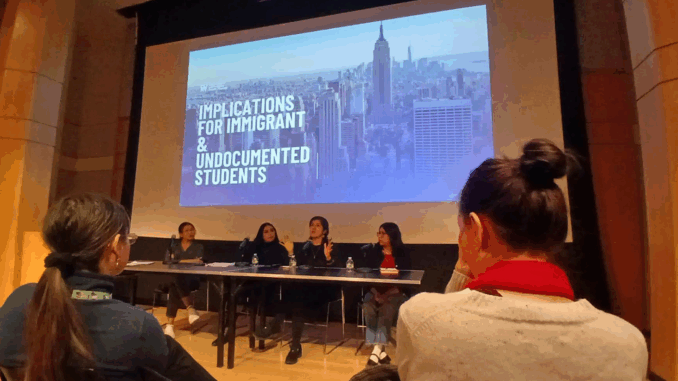
BY ROSSI SEALEY
Cynthia Carvajal, Director of Undocumented and Immigrant Student Programs at CUNY, told an audience at the Segal Theater in Manhattan on November 18 that the City University of New York and New York State are behind in supporting immigrant and international students.
“The New York State Dream Act just passed in 2019,” she told a small crowd. “New Jersey had it before, Texas has had it for years. So it demonstrates that New York is really behind legislatively as it relates to immigrant and undocumented students,” Carvajal said. “Even access to certain majors is restricted depending on your immigration status at CUNY, SUNY, or other institutions.”
The New York State Dream Act is a law that enables undocumented students to apply for state financial aid and scholarships for college.
The event, Learning Without Borders: Immigrants Transforming Higher Education, was hosted by Future Initiatives, a program founded in 2014 at the CUNY graduate center, and promotes and advocates for equity and innovation in higher education through education, research, teaching and social justice. Also, co-sponsoring was CUNY CLEAR, an acronym for Creating Law Enforcement Accountability and Responsibility, a free legal services clinic for communities in NYC. The panel was designed to both review existing resources and advocate for more of them.
Carvajal emphasized advocacy and movements from students, faculty, and community leaders to allow people in CUNY to create many possibilities for themselves; an example of this is the Immigration Student Success Centers.
In late 2023, only Brooklyn College and John Jay College had Student Success Centers for immigrant students in the CUNY system. But campaigns and protests from The City College of New York (CCNY)’s Dream Team Club students, a long-term effort, led to the center’s opening on April 15, 2024. CUNY currently has four immigrant Student Success Centers, including one at Hunter College, which opened in 2024.
Carvajal compared CUNY’s and New York State’s immigration Student Success Centers to those in other states like California, which have many more such programs in its state higher education institutions.
Current national immigration policies are impacting international and undocumented students, affecting their academic and professional environments. Challenges include mass deportation concerns, mental health struggles, limited resources, financial aid hurdles, and racial profiling.
Panelist Lesly Ramirez Melchor, Baruch College Alumna and CUNY Peer Leaders Alumna, highlighted challenges students face amid raids by Immigration and Customs Enforcement (ICE) and evident racial profiling, emphasizing the need for professors to be understanding and flexible with attendance policies.
There are strict guidelines, she said. “If you miss this amount of days in classes, we are going to have to fail you,” said Melchor. “It’s like, where do we start having these conversations with our students, being like hey, I understand the political climate that’s happening now, so I want to talk to you and give you options of how we can go around this where you can still learn but not miss classes because of the fear of what is going on right now.”
Panelist Sunisa Nuonsy, CUNY Futures Initiative Peer Leaders Facilitator and PhD student, pointed out that high school staff often lack immigration knowledge, which can hinder student support. “Eligibility [is] changing, the Dream Act just passed, the ways you have to fill out the FAFSA, it’s kind of secretive…and largely guidance counselors don’t know this…so they end up misinforming students,” she said, referring to the required college financial aid application form.
Carvajal added that immigration awareness and knowledge is a community effort. “It’s important for US citizens to know this information because they may have friends, neighbors, family members that might need the information,” she said.
